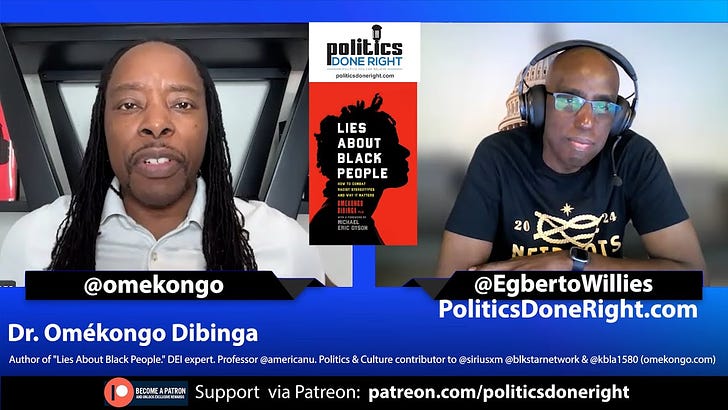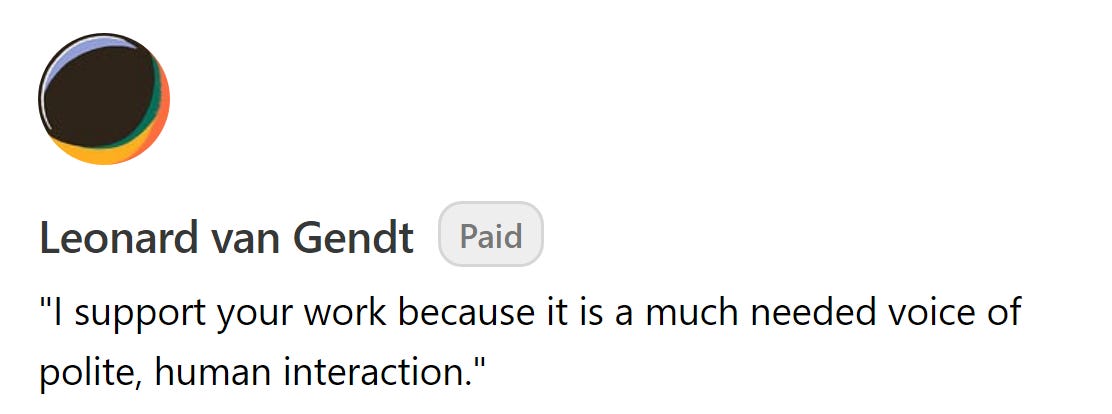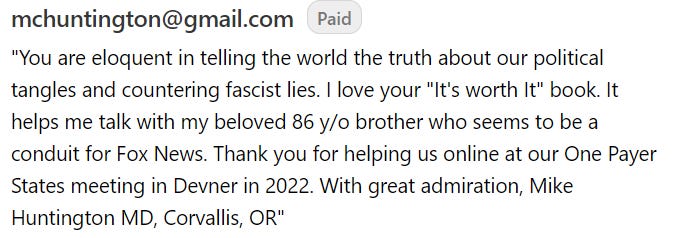Dr. Omekongo Dibinga discusses ‘Lies About Black People’ & and the state of our politics.
Dr. Omekongo Dibinga, author of “Lies About Black People,” visited to discuss the election, the state of our politics, and his recent book.
NOTE: We need 300 new paid subscriptions to meet November’s goal! Please make a difference.
We are grateful for our Paid Subscribers and Free Subscribers. In this political climate, we need several hundred more Paid Subscribers. Misinformation funded by the deep pockets of our Oligarchy floods the internet. We are using all our platforms on-air, online, and in publications to counter that. We ask that you invest the equivalent of less than a coffee to ensure we can keep doing this effectively. Please invest in a Democracy that serves all of us by becoming a paid subscriber. It comes with many benefits.
Dr. Omekongo Dibinga on politics and more.
Summary
Dr. Omekongo Dibinga, author of Lies About Black People, discusses his mission to inspire individuals to combat injustice and stereotypes, emphasizing the importance of education and activism in addressing societal challenges. He critiques systemic issues like racism, misogyny, and disinformation, advocating for progressive coalitions and increased intellectual curiosity. He calls for bold leadership and robust engagement in education and political platforms to combat inequality and inspire change.
Key Points
Educational Crisis: Dr. Dibinga highlights the attack on educators and the erasure of critical history as deliberate strategies to suppress knowledge and progress.
Systemic Misogyny and Racism: He argues that Trump’s political rise reflects deep-seated societal biases that disadvantage women and people of color in leadership.
Value of Social Media: Platforms like TikTok are vital for spreading accurate information, but their algorithms often favor misinformation, requiring active participation by educators and activists.
Coalition Building: Progressive movements must focus on uniting diverse groups, addressing disinformation campaigns, and empowering historically marginalized voices.
Call for Progressive Boldness: Democrats should reject outdated strategies and unapologetically support transformative policies, placing justice and equity at the forefront.
Progressive Perspective
Dr. Dibinga’s insights underscore the urgent need for a progressive revolution in education, politics, and activism. His call to create informed, active citizens serves as a rallying cry for those committed to equity and justice. Progressives must resist fear-driven politics and champion leaders who reflect the diversity and strength of their communities, demonstrating that change is not only possible but inevitable.
Dr. Omekongo Dibinga is a man of many talents—an educator, poet, rapper, speaker, and advocate for justice. His life’s mission centers on inspiring people to stand up against injustice, fostering communities where individuals are celebrated rather than merely tolerated. His recent book, Lies About Black People: How to Combat Racial Stereotypes and Why It Matters, explores the pervasive and damaging effects of racial stereotypes in the United States, providing both a critique and a call to action. In a recent conversation, Dr. Dibinga discussed his journey, his work, and the state of American politics, offering a sharp and inspiring perspective on these issues.
A Mission Rooted in Justice and Education
Dr. Dibinga’s background reflects a deep connection to activism and education. Born in Cambridge, Massachusetts, to Congolese parents who earned doctorates at Harvard, his upbringing was steeped in Pan-Africanist values. These roots shaped his lifelong commitment to global justice and intercultural understanding. His academic pursuits have been as diverse as his interests, ranging from international affairs to education policy. Notably, he wrote his doctoral dissertation on Jay-Z, blending his passion for hip-hop with scholarship—a testament to his belief that culture and academia can intersect to drive social change.
Today, as an American University professor and Upstander International leader, Dr. Dibinga continues this work by training individuals to be “upstanders” rather than bystanders. This mission is vital in a world increasingly divided by misinformation, systemic inequities, and cultural misunderstandings.
The Role of Education in Combatting Misinformation
Central to Dr. Dibinga’s philosophy is the belief that education is a cornerstone of societal progress—and a primary target for those who fear change. He notes that attacks on education, particularly on teaching history and critical race theory, are not merely a lack of respect for the profession but a strategic effort to suppress knowledge. Teachers, particularly those focused on history and librarians who curate diverse narratives, are under siege because they hold the keys to empowering young minds.
Dr. Dibinga argues that this assault on education is directly linked to the political disarray in the United States. For example, decades of neglecting civics education have left many Americans ignorant of basic governmental functions, leading to widespread susceptibility to disinformation. Banning over 10,000 books in recent years is another alarming trend, reflecting a fear of education’s power to challenge entrenched ideologies.
The State of Our Politics: Racism, Misogyny, and Disinformation
Dr. Dibinga’s analysis of the political landscape is incisive. He observes that the election of figures like Donald Trump reflects deep-seated racism and misogyny, as well as a calculated exploitation of these societal fault lines. Trump’s appeal, he notes, was rooted in identity politics—the politics of white male supremacy—. Yet, it was his critics, such as Kamala Harris, who were falsely accused of divisive identity politics.
The persistence of these dynamics underscores the challenges facing candidates from marginalized groups. Vice President Harris, for instance, faced a unique confluence of racism and sexism in her presidential bid, reminiscent of Shirley Chisholm’s assertion that gender bias can often outweigh racial bias in American politics. Dr. Dibinga argues that these challenges are not insurmountable but require a concerted effort to build coalitions that transcend identity-based divisions.
Social Media and the Battle for Truth
In today’s media-saturated world, platforms like TikTok have emerged as battlegrounds for shaping public opinion. Omekongo acknowledges the power of these tools for disseminating information but also warns of their potential for manipulation. Algorithms often amplify misinformation or trivial content over substantive, fact-based discussions. Despite these challenges, he believes educators and activists must engage with these platforms to counteract disinformation and reach younger audiences.
The Progressive Path Forward
Dr. Dibinga advocates for a bold, unapologetic progressive agenda. He criticizes the Democratic Party’s reliance on outdated strategies that cater to the mythical “middle ground” rather than energizing the base and addressing systemic issues head-on. Progressives, he argues, must reclaim their voices and refuse to cede ground on critical issues like healthcare, education, and racial justice.
One key point is the importance of political sophistication among progressive movements. Disinformation campaigns, such as those targeting Vice President Harris’s stance on Israel and Palestine, successfully sowed doubt among potential voters. This highlights the need for progressives to develop sharper strategies to counteract these narratives and mobilize their base.
Conclusion: Education as Liberation
Dr. Omekongo Dibinga’s insights are a clarion call for action. He emphasizes the importance of challenging stereotypes, combating disinformation, and fostering a more equitable society through education, activism, or political engagement. His work reminds us that the fight for justice is multifaceted, requiring courage, creativity, and an unwavering commitment to truth. As he aptly puts it, the future depends on creating upstanders—individuals willing to challenge injustice wherever it arises. For progressives, this means addressing systemic inequities and building a movement that reflects the diversity and resilience of the communities they aim to serve.
Viewers are encouraged to subscribe and join the conversation for more insightful commentary and to support progressive messages. Together, we can populate the internet with progressive messages that represent the true aspirations of most Americans.
Can we count on your help to reach our goal of 300 needed new paid subscriptions by the end of the month?
The other side has big donors and everyday citizens who invest heavily in platforms that lie and misinform. All we have is you. So, please invest in our media outlet by clicking the subscribe button below to become a paid subscriber. You won’t miss that coffee, but it will make a difference in our politics as we spread the truth about our policies and progressive politics. All paid subscribers get to read my five books on this platform and all subsequent books I write. They will also be privy to subsequent incentives.








